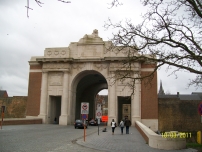| First Name: | George Edward | Last Name: | SMITH | |
|---|---|---|---|---|
| Date of Death: | 31/10/1914 | Lived/Born In: | Homerton | |
| Rank: | Lance Corporal | Unit: | South Wales Borderers1 | |
| Memorial Site: | Menin Gate, Ypres | |||
Current Information:Age-18 45, Mabley Street, Homerton
First Battle of Ypres Between 21st October and 22nd November, 1914 a desperate fight took place around the Belgium city of Ypres, the first of three major battles that were to be fought there during the course of the war. British troops entered Ypres in October. The 1st and 2nd Divisions plus the 3rd Cavalry Division had made their way up from the Aisne as part of the “Race to the Sea”, whilst the 7th Division came west to Ypres after Antwerp had fallen. The Germans knew that Ypres was the gateway to the Channel ports and that these were vital to Britain’s war effort so they poured reinforcements into the area. The fighting fell into three distinct battles; the Battle of Langemarck, 21-24 October, the Battle of Gheluvelt, 29-31 October and the Battle of Nonne Bosschen, 11 November. Ypres did not fall to the Germans but its defence during these two months resulted in the destruction of much of the old regular British Army. From 29th to 31st October a massive concentration of German troops tried to break the British line around Gheluvelt at the eastern apex of the Ypres salient where1st and 7th Divisions stood in their path. On the 29th October, after a day of intense fighting, often hand to hand, the British were pushed back to the Gheluvelt cross roads. The following day the Germans attacked Gheluvelt itself and although the village remained in British hands, German troops had some success further south at Zandvoorde and were now able to enfilade the British line. Then on 31st October came the main German attack and Gheluvelt fell. At one stage the it seemed that all was lost but a dramatic counter attack by 2nd Worcestershire, stabilised the line. However, the loss to the British army had been enormous. The Germans attacked Gheluvelt on 31st October at 6 am with no preliminary shelling and no fog to conceal them. The attack fell on 1st Division including the 1st South Wales Borderers battalion of 3 Brigade who, along with 2nd Welsh and 1st Scots Guards were in position north of the Menin road. At first the attack was beaten off everywhere except for a small lodgement in an orchard where a platoon of 2nd King’s Royal Rifle Corps, 2 Brigade were supporting 1st Royal West Surrey (Queens). However, from their foothold here the Germans could enfilade the front line of 1st Queens and they began a systematic bombardment of 3 Brigades’ trenches whilst bringing up more men. At 10 am the Germans launched a converging attack against Gheluvelt from both south and north of the Menin road. Thirteen German battalions, six of them fresh, attacked 2nd King’s Royal Rifle Corps, 1st Royal West Surrey (Queens), 2nd Welsh, 1st South Wales Borderers and 1st Scots Guards, barely 1000 men in all. The Germans charged cheering and singing, believing the Kaiser to be present, but British rapid fire held them up for an hour. However, in the end, weight of numbers told especially when two German batteries moved up close and began firing. In front of 1st South Wales Borderers was a thick copse which saved that part of the line from the worst of the German artillery At 11.30 am the Germans broke into Gheluvelt and an hour later the two right companies of 1st South Wales Borderers were forced back through the grounds of Gheluvelt chateau to its north-western edge. Somewhat sheltered by the copse, the rest of the battalion, mixed up with 1st Scots Guards, managed to hold on. Those that had fallen back immediately counter attacked and retook the south-eastern edge of the chateau grounds. The line now ran along the chateau wall which ran obliquely behind the original line. That night Gheluvelt was abandoned. 1st South Wales Borderers and the other units, withdrew to a line with its right on the Menin road, 600 yards west of Gheluvelt . At some stage of the fighting on 31st October, George Smith was killed in action. |
||||
| « Back to Search Results | ||||
| If you think any of the information shown here is incorrect, Click Here to submit your amends and comments | ||||




